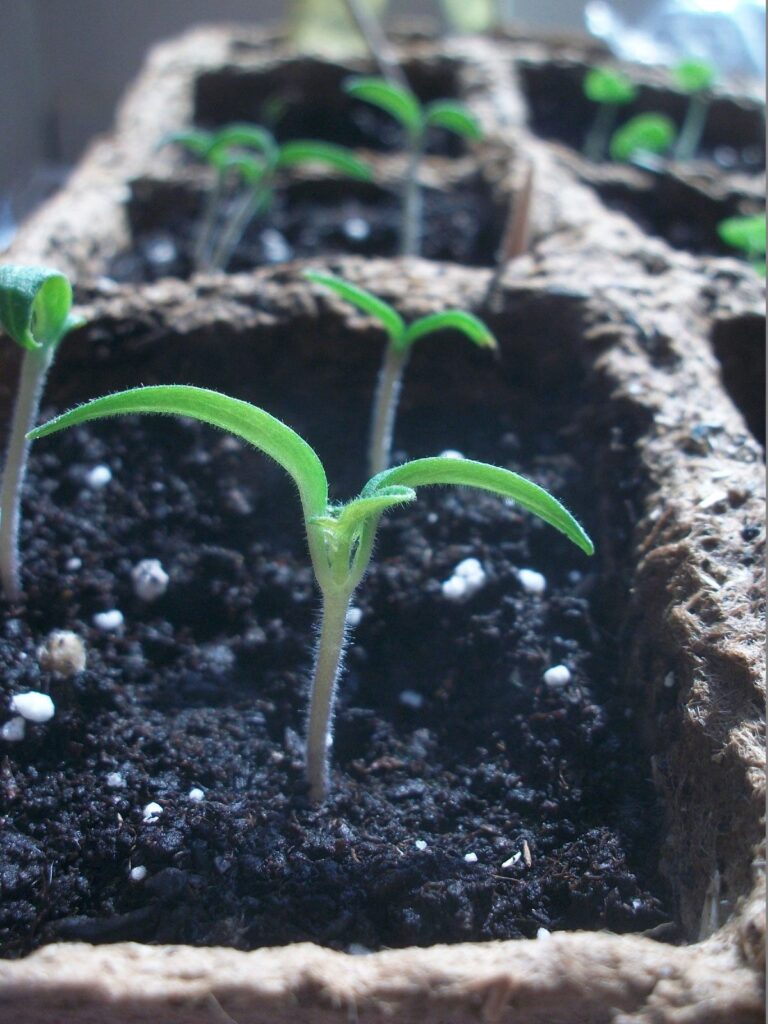
Tiny garden plants snuggled into the soil arranged in tidy rows. Each day brought a little more sun and a little more warmth, as the seedlings stretched out their leaves and wriggled their roots deeper into the dirt. Two tomato plants raised side-by-side since their greenhouse days talked about the days ahead.
“I’m gonna grow watermelons!”
“Carl, you’re a tomato plant. There’s really nothing you can do about it,” his neighbor said.
“If I can conceive it, I can achieve it!”
“I think it’s more complicated than that, and you may strain yourself and get weedy. Then where will you be?”
“I’m going to make watermelons. You’ll see.”
Summer brought more heat and sunlight, and the plants made their gradual climb toward the sky.
“It’s happening, Frank. I can feel it!”
“Carl, why not just be the best tomato plant you can be? What’s wrong with that? Make your fruit extra plump, or sweet, or pleasingly tart.”
“Think small, be small. That’s your problem, Frank, but don’t make it mine.”
As the plants grew, they began to take familiar shapes with flowers appearing on their stems and supports placed around them to offload their eventual fruit.
“See, they can tell I’m going to grow watermelons. Look as this metal stand. I’ll bet I bend the bars with my massive melons.”
“We all have the same cages, Carl. Can’t you just enjoy the sun, the soil, and the water?”
“Dream it, plan it, do it. Just wait ‘til these melons start to ripen, then you’ll see what mind over matter can do.”
The summer rolled on, and indeed something looked odd with one of the tomato plants. Rather than green orbs sprouting from the stems, the fruit was green with mottled stripes. The gardener figured some sort of hybrid had gotten into the mix and was curious to see how it would turn out. She began to throw a little extra compost at the base of the plant and checked its progress daily.
“See. What did I tell you? Do you get extra compost, Frank? Do you get your fronds stroked every day? Do you have bugs groomed from your leaves? She can tell I’m special. And you doubted me!”
“I think you strained your fruit, Carl. I don’t know how you did it, but you must have broken something, and now you’re going to grow wooden knobs in place of tomatoes and wind up on the compost pile before the season is over.
“Jealous much?” Carl asked.
As the striped tomatoes grew, they elongated and became much larger than fruit on the surrounding plants. The tomato cage around it was soon overwhelmed, and the gardener had to put extra supports in place.
“See Frank? Umph. I told you I could do it. Grunt. Just some, ugh, will power and, ergh, determination. Look at these melons!” said Carl, groaning and panting from the weight of his mighty fruit.
“Look at yourself. You’re a freak. And for what? We’re annuals, you fool. You’ve made yourself into a grotesque oddity. A tomato plant can’t grow watermelons! God only knows what you’ve got inside those, those … things! But I’m sure it’s not edible and may even be poisonous.”
“You’re a sad little plant, Frank,” chided Carl.
In the final weeks of the growing season, Carl’s fruit looked like perfectly ripe watermelon. The gardener gave up trying to support his stems, instead gently lowering him to the ground to take the strain off his limbs. The gardener brought friends by to see her strange tomato plant. She called the extension office, which sent a crop investigator. He eyed the tomato’s watermelon fruit, shining in the sun, and looking on the verge of bursting.
“Have you tried one yet?” the investigator asked.
“No, I’ve just let them grow. I wanted to see how big they’d get.”
“Do you mind if I try one?”
“Go ahead. I’m dying to see what’s inside!”
The investigator knelt and gently moved Carl’s fronds aside to find the most promising fruit.
“You see? Did I tell you? I’m going to be famous! Everyone will want my seeds, and I’ll live forever. Nobody’s going to remember you, Frank. Just another ordinary tomato plant.”
The investigator tugged on one of Frank’s melons and separated it from the stem with an easy twist. “The weight feels good, nice and heavy.” He thumped its side, which echoed a dull thud. He set the melon on a nearby gardening table, moving some pots and tools to make room. Taking a folding knife from his pocket, the investigator pierced the flesh and pulled the blade through the rind halving it in one movement. As it broke open, clear water poured out, leaving two hollow halves like a giant eggshell. A few small, milky tomato seeds floated in a puddle on the table.
The investigator shrugged. “Well, I guess that’s that. Looks like something went haywire, probably cross-pollination or some such. Funny what can happen.”
Carl cried out, “No! Don’t you see! I grew watermelons! I grew watermelons!”
“Let it go, Carl. Let it go,” offered Frank. “Just enjoy the sun. You tried your best, and you came close. Damn close.”
“Yeah, I guess,” sniffed Carl.
“Now, let’s see how big you can grow those watermelons before the season ends.”
“Thanks, Frank. I’ll do that.”